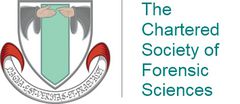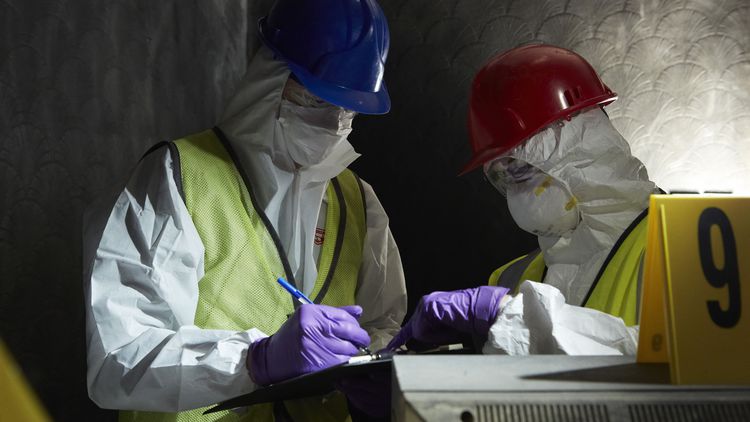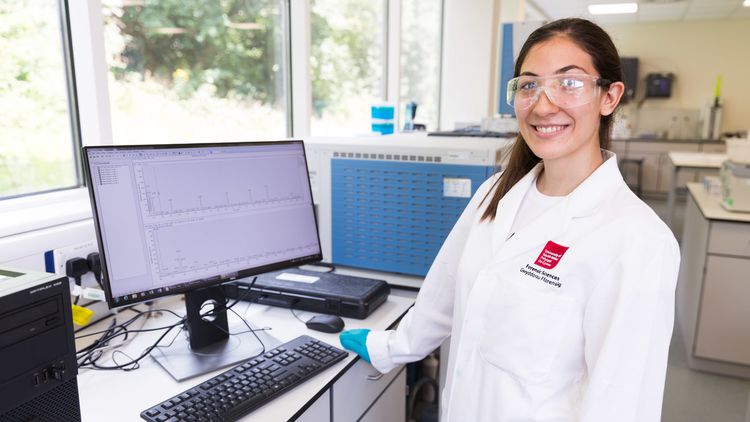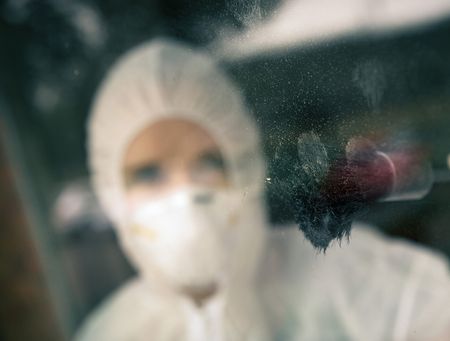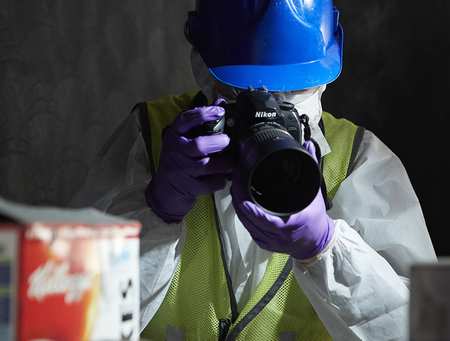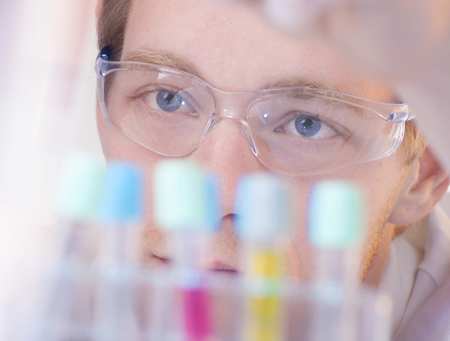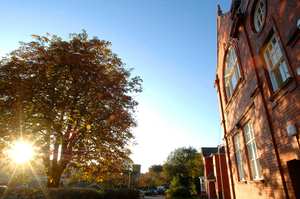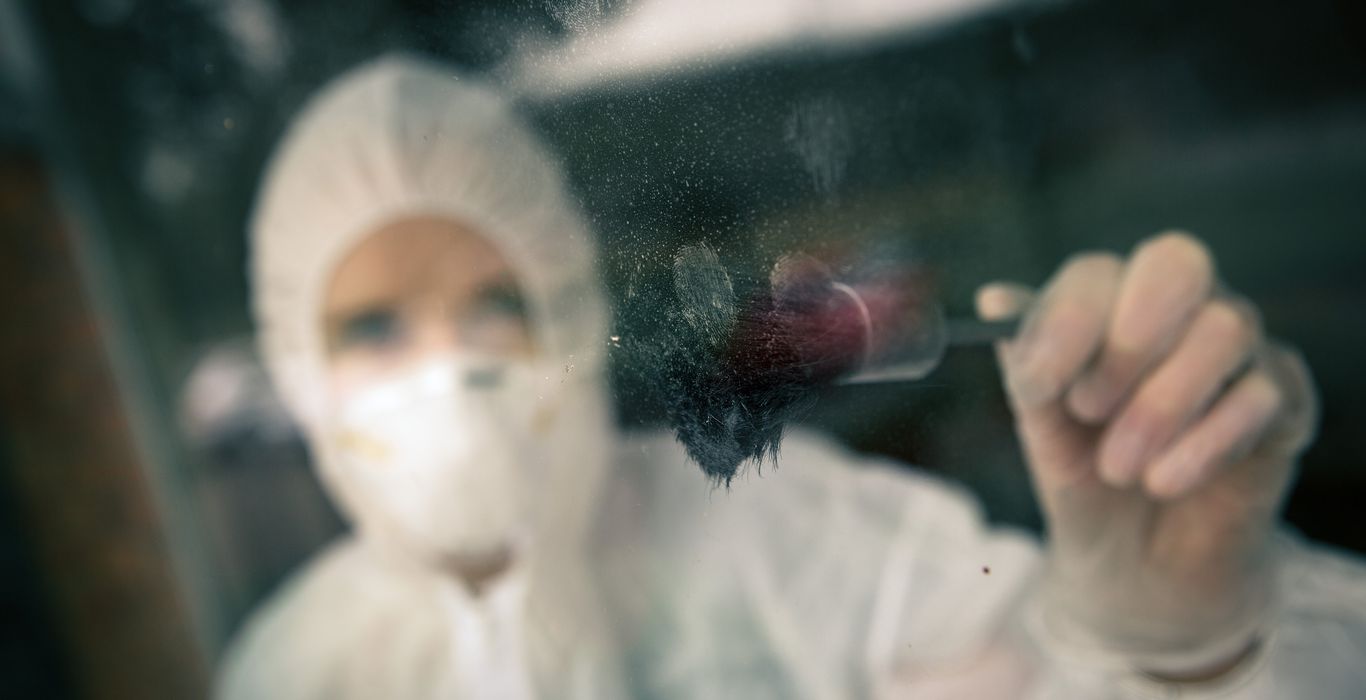
BSc (Hons) Forensic Science (Including Foundation Year)
The Foundation course in Forensic Science is for students who don’t meet the entry for the BSc (Hons) Forensic Science degree. You’ll start by completing a foundation year, which provides well structured support, allowing you to develop your scientific skills and knowledge.
Accredited by The Chartered Society of Forensic Sciences, this Forensic Science course has a strong focus on employability and you’ll study the entire process from crime scene to court.
Following successful completion of a common first year curriculum, students choose to follow either an Analytical or a Biology Forensic Science pathway depending upon their personal preference during the second and subsequent third year.
You will be trained in standard practices and techniques used in crime scene investigation, as well as laboratory analysis of evidence and its interpretation. You’ll study specialist branches of forensic science, including criminalistics, chemistry, biology, anthropology, major scene investigation and toxicology.
Our Forensic Science course has a very strong scientific base, which means you’ll be employable in a number of scientific sectors.
The forensic science degree covers a wide range of sciences, from criminalistics to chemistry and biology. You will develop the concepts of crime scene investigation protocol and gain scientific knowledge of the chemical and biological analytical techniques used to assist investigations. The course has been developed to build each year on the knowledge learnt in previous years and is taught to develop theoretical skills and then getting to put those skills into practice in a practical setting.
The first year of your forensic science degree introduces you to the theoretical and practical knowledge and skills in biological, analytical chemistry and crime scene investigation employed within forensic investigation.
Following successful completion of a common first year curriculum, students choose to follow either an Analytical or a Biology Forensic Science pathway depending upon their personal preference during the second and subsequent third year.
The second year of your forensic science will enhance your practical skills and theoretical knowledge through forensic evidence and crime scene examination. You will develop your skills in applying chemistry techniques and your understanding of either analytical chemistry or biological science within forensic investigation depending upon the pathway chosen.
In the third year you will study advanced modules, critically analysing forensic case studies as well as developing advanced skills in either the analytical chemistry or biological science depending upon the pathway chosen as well as taking the Research Project and Employability Skills module.
Foundation Year: Forensic Science Degree
Introduction to Forensic Investigation
This will cover an introduction to critical thinking and the scientific process. What is an enquiry? What is an investigation? Basic processing tools and flows to solve an enquiry or investigation. Information gathering. Information analysis. Forming logical conclusions based on fact and scientific data.
You will examine forensic science as a discipline. Introduction to the core branches of forensic science, and identification of selected evidence types. The scope of forensic evidence and rules of forensic science. You will also cover case studies. Analysis of crime cases with special emphasis on investigation, the sifting and presentation of evidence and key issues raised in trials, plus key elements of Criminal Justice, the Criminal Justice system and the Courts.
Scientific Data Literacy
This module is designed to develop and support the students application of numerical literacy and data handling set in the broad context of science. It covers an introduction to quantitative science, units and measurement; the principles of basic arithmetic, BODMAS, and negative numbers; decimals and the use of significant figures, fractions, indices and scientific notation; the application of algebra and simplification/rearrangement of equations; the use of Excel, a scientists tool for manipulating data: its use to record, manipulate, analyse, and present data. I
Key Skills in Professional Development
Students will be introduced to academic life and expectations. Beginning with identifying their own strengths and weaknesses as an active learner, students will evaluate and reflect on their approach to learning and utilise new skills to improve their experience. Concepts and skills surrounding sourcing information, acknowledging the work of others, and information handling will be integrated to provide students with skills helpful for their future academic and lifelong studies.
Foundation Chemistry
This module is designed to introduction students to the fundamental chemical concepts needed to support future modules. It involves organic and inorganic chemistry, qualitative and quantitative chemical reactions and is taught to encourage students to have an inquiring and investigative approach.
Foundation Biology
Students are introduced to the essential biological concepts such as cell structure and organisation. The application of enzymes, nucleic acids and the passing of genetic information. How the genetic code and cells function to support the applications of reproduction and genetics.
Physical science
This modules covers areas such as the atomic structure and the stability of the nucleus. It introduces students to light and spectroscopy and the factors that affect the rate of reactions. It also introduces students to chemical equilibria.
Year One: Forensic Science Degree
Introduction to Forensic Analysis
This module introduces students to the fundamental aspects of evidence processing techniques through a combination of laboratory-based training exercises and theory-based learning. Students will develop an appreciation of a range of laboratory techniques applied to trace particulates and biological evidence materials, including, search, recovery, creating professional contemporaneous case notes to contribute to the laboratory casefile, basic microscopy, and chemical testing for the presence of biological materials.
Introduction to Crime Scene Investigation
The practice of forensic science requires an understanding of a broad range of forensic topics and involves many investigative techniques. This module will provide you with the knowledge, practical understanding and technical ability relating to the investigation of crime. Here you will study introduction to crime scene investigation; documentation; collection and preservation of physical evidence; interpretation of crime scene evidence and crime scene reconstruction.
Key Skills for Forensic Science
This module will provide you with an appreciation of the principles of safe working in laboratories, accident prevention and the promotion of safety in the workplace and the consequences for health due to exposure to hazards. You will develop an understanding of the information concerning hazards in performing experimental work and in the calculation of the probability of an accident and to estimate risk. Additionally, the use of IT for scientific working, accessing journals and referencing skills are provided.
Genetics and Evolution
Students work to learn the key principles of genetics and the theory of evolution to gain an understanding of the structure and organisation of DNA, how DNA replication work and how we get from gene to protein. This module will also provide students with laboratory experiences relevant to working with DNA in a laboratory setting.
Fundamental Organic Molecules and Analysis for the Forensic Sciences
This module is designed to introduce students to a variety of concepts in organic, biological, and analytical chemistry that is needed for forensic science. Students are able to build on their laboratory skills to support the development of other analytical skills.
Chemical Concepts
Students are able to gain knowledge of fundamental concepts of physical and inorganic chemistry to support with future modules but also develop keys skills such as problem solving and critical thinking. Students will be able to look into analytical and instrumental techniques to understand their chemical basis. Laboratory sessions will develop the necessary laboratory skills.
Year Two: Forensic Science Degree
Analysis and Interpretation of Evidence
To extend the student’s practical capabilities and knowledge pertaining to particulate and biological trace evidence analysis with a particular focus on the use of sector-standard instrumentation, quality control processes and sector-standard documentation. To introduce students to the interpretation and presentation of scientific data generated from analytical techniques.
Volume Scene Investigation
Within this module you will gain practical digital imaging, crime scene photography and video experience recording a variety of crime scenes scenarios. This will involve studying the theoretical aspects of photography, and equipment: Films and film speeds, camera formats, focal length, aperture and depth of field, lighting techniques and flash. In addition to this, you will gain practical training in core skills for the crime scene investigator within a series of simulated volume crime scenes including vehicle examination.
Forensic Examination of Human Remains
To introduce students to the strategic and unique aspects involved in the analysis of human remains. To provide a detailed description of scientific and technological methods used in the investigation of victims of crime or natural disasters.
Human Molecular Genetics
Students build on the genetics learnt in the first year to understand molecular genetics and the genetic basis of inherited disorders. Students gain an understanding of the practical applications of molecular biology techniques and how these are used to study genetics.
Modern Techniques in Analysis and Identification
Through this module, students learn the theory and practise around the analytical techniques which are used in forensic science. This covers subjects such as spectroscopy which is essential in the identification of substances and how we can use a variety of techniques to understand the chemical structure of compounds.
Analytical Pathway – Applications of Forensic Analysis
This module deals with how we can use analytical techniques within the forensic setting. It investigates how a forensic chemist can use analytical techniques in the identification of evidence such as illicit drugs. It also covers how fire residue, and the investigation of soil compounds can be used in Forensics.
Biological Pathway – Forensic Biology and Microbiology
Students will be learning about cell biology, microbiology and biochemistry. Through this is will give the learner the opportunity to develop an understanding of the complexity of cellular life. The module also explores the value and theoretical basis of biological evidence in forensics as well as looking at how microbes can contribute to human disease which can lead to death.
Year Three: Forensic Science Degree
Research Project and Employability Skills
This will involve the scientific evaluation of cases and evidence and statistical evaluation of forensic evidence and professional ethics and standards. Cases will include forensic pathology, homicide, suicide and accidental death amongst others. In addition to this, you will be introduced to the court room processes and the role of the expert witness, barristers, cross-examination and evidence in chief. As part of this module, you will conduct a literature review which will involve a critical evaluation of primary information and data on a selected topic within forensic science.
Forensic Casework and the Expert Witness
To allow the development and application of teamwork, critical thinking and forensic skills through the experimental design and processing of a simulated forensic case with particular attention to DNA, paint and glass evidence, QA and the interpretation of analytical data using statistical methods. To allow the student to consolidate and advance their understanding of the regulations applying to forensic practitioners when analysing, interpreting, and presenting evidence and to develop knowledge and skills to be able to provide witness testimony.
Major Scene Examination
This module aims to allow you to develop a detailed knowledge of the forensic criminal investigation process and gain a critical understanding applied to a range of specialist and serious offences described as major incident investigations. You will apply associated learning through exposure to relevant and related simulated major scene scenarios and case studies.
Applied Forensic Toxicology
This module introduces students to the study of toxicology and builds an understanding of the effects toxic substances can have on the body. It introduces students to the principles of absorption, distribution, metabolism and excretion as well as using practical laboratory classes to understand the investigation of toxicological substances.
Technical Forensic DNA Analysis and Interpretation
Students will be able to use all the theory learnt on the course and apply this to the forensic applications. It explores how molecular genetics are used in forensic settings by exploring areas such as DNA profiling and how this comes about from crime scene stains.
Analytical Pathway – Advanced Analytical Techniques
This has been developed to provide students with the advanced skills that would be needed within the workplace. Building on study in previous years this module advances process such as extraction techniques which are essential for forensic work but also looks into the importance of good chromatography for quantitative analysis. It also investigates the applications of analytical techniques such as LC-MS/MS and q-NMR.
Biological Pathway – Environmental and Wildlife Forensics
Through this module, students can develop an understanding of the application of forensics within the fields of environment and wildlife crime. This covers subjects and areas such as the law and legislation relating to wildlife crime and the microscopy and DNA analysis which may be needed. It investigates the tools that may be employed in the investigation of environmental crime and how specialist tools like GIS are used along with the scientific analysis of soils.
Teaching
This forensic science degree will involve about ten hours in lectures and small group tutorials, and up to ten hours of practical work each week.
You will be taught through a mixture of lectures, tutorials and practicals. The number of hours of formal teaching will vary depending on your module choice and year of study. In addition to lectures from the staff at The University of South Wales, guest lectures are delivered by external specialist experts in their field as part of the module delivery and additionally through presentations organised by the University Forensic Science Society and Chemistry Society.
In addition many events are held during the year such as Career Fairs and Career conferences where students will have an opportunity to find out more about prospective careers and meet prospective employers.
Assessment
You will be assessed by a combination of different approaches including end of year examinations, in-term tests, practical and laboratory skills assessments, written essay-style coursework, online short answer assessments, laboratory reports, simulated case work files, preparation of witness statements, data analysis exercises, mock court sessions and oral presentations.
Many of the tasks and assessments you will complete have transferable and employability skills deeply embedded within them including independent learning, working as part of a team, numeracy, planning, organisation and communication skills, as well as allowing you to develop professional skills for practice in forensic science
Accreditations
The BSc (Hons) Forensic Science course is accredited by The Forensic Science Society in three component standard areas - Crime Scene Investigation; Laboratory Analysis and Interpretation, Evaluation and Presentation of Evidence.
Placements
To increase your employability, you may be eligible to spend a year working in industry mid-way through the course, which is an excellent way to expand your range of skills.
Facilities
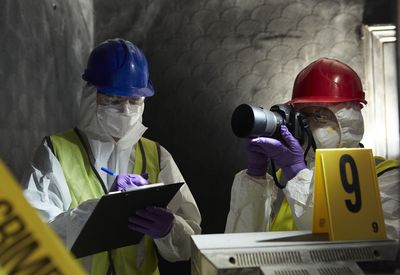
Our excellent facilities include a multi-room Crime Scene Training Facility, dedicated instrument laboratories and a DNA analysis suite. This gives you experience in crime scene examination and chain of custody processes, as well as potential issues at crime scenes.
The Forensic Science programme focuses on practical investigative skills in the forensic laboratory. You’ll benefit from industry- standard instruments, providing you with skills in a wide range of evidence examination techniques.
Lecturers
- Helen Higgins
- Paul Jones
- Mark Boulter
- Zella Parry
- Yvonne Turner
- Suzy Kean
- Andy Graham
- Gareth Powell
- Natasha Galea
- Ryszard Babecki
- James Cruwys
- Tony Davies
- Rehana Karim
- Christian Laycock
- Martin Powell
- Jeroen Nieuland
- Emma Hayhurst
- Tracie McKinney
- Sorcha Diskin
- Hannah Minton
- Katie Bird
- Peter Miedziak
- Sky Readhead
- Peter Eden
- Mia Lambert
- Sheri Murrell
- Alexandra Maneta
- Tracie McKinney
- Lewis Fall
- Gareth Powell
- Sioned Owen
- Cerith Jones
- Josie Bradley
- Natalie Lubbock
- Meirion Pugh
We regularly revalidate courses for quality assurance and enhancement
At USW, we regularly review our courses in response to changing patterns of employment and skills demand to ensure we offer learning designed to reflect today’s student needs and tomorrow’s employer demands.
If during a review process course content is significantly changed, we’ll write to inform you and talk you through the changes for the coming year. But whatever the outcome, we aim to equip our students with the skillset and the mindset to succeed whatever tomorrow may bring. Your future, future-proofed.
Contextual offers
We may make you a lower offer based on a range of factors, including your background (where you live and the school or college that you attended for example), your experiences and individual circumstances (as a care leaver, for example). This is referred to as a contextual offer and we receive data from UCAS to support us in making these decisions. USW prides itself on its student experience and we support our students to achieve their goals and become a successful graduate. This approach helps us to support students who have the potential to succeed and who may have faced barriers that make it more difficult to access university. Here is a link to our Contextual Admissions Policy.
Other qualifications and experience
We can also consider combinations of qualifications and other qualifications not listed here may also be acceptable. We can sometimes consider credits achieved at other universities and your work/life experience through an assessment of prior learning. This may be for year one entry, or advanced entry to year two or three of a course where this is possible.
To find out which qualifications have tariff points, please refer to the UCAS tariff calculator.
If you need more help or information or would like to speak to our friendly admissions team, please contact us here
Please note that whilst this course does not require a DBS Check for entry, some professions will not consider candidates who have certain types of criminal convictions. Therefore, if you have a criminal conviction and you are considering a particular career path we would recommend that you check with the relevant professional body or refer to their recruitment policy to make sure that your conviction will not disadvantage you.
Typical A-Level Offer
DD, 48 tariff points to include a relevant Science subject but excluding General Studies
Typical Welsh BACC Offer
N/A
Typical BTEC Offer
BTEC Extended Diploma Pass Pass Pass or BTEC Diploma Pass Pass in a relevant subject
Typical Access to HE Offer
Pass Access to HE Diploma in Science with a minimum of 48 UCAS Tariff points
Additional Requirements
GCSEs: The University normally requires a minimum 3 GCSEs including Mathematics and English at Grade C/Grade 4 or above, or their equivalent but consideration is given to individual circumstances
International Entry Requirements
We also welcome international applications with equivalent qualifications. Please visit the country specific pages on our international website for exact details.
If your current qualifications don't meet the entry requirements for entry onto year 1 of your chosen undergraduate degree, we offer one-year International Foundation Programmes through our pathway partnership with QAHE to help you reach the level required for progression. For more information visit our Pathway website.
English Requirements
In general, international applicants will need to have achieved an overall IELTS grade of 6.0 with a minimum score of 5.5 in each component.
However, if you have previously studied through the medium of English IELTS might not be required, but please visit the country specific page on our international website for exact details. If your country is not featured please contact us.
Full-time fees are per year. Part-time fees are per 20 credits. Once enrolled, the fee will remain at the same rate throughout the duration of your study on this course
August 2024 - July 2025 Fees
Full-time UK: £9000
Full-time International: £15260
August 2025 - July 2026 Fees
Full-time UK: TBC
Full-time International: TBC
Student Perks
At the University of South Wales, you’re investing in so much more than a degree. We strive to provide our students with the best possible experience, no matter what you chose to study. Whether it’s access to top of the range mac books and PCs, state-of-the-art facilities packed with industry-leading equipment and software, masterclasses and events led by industry experts, or a wide range of clubs and societies to meet likeminded people, better tomorrows start with extra perks.
Each course also has their own unique student benefits to prepare you for the real word, and details of these can be found on our course pages. From global field trips, integrated work experience and free course-related resources, to funded initiatives, projects working with real employers, and opportunities for extra qualifications and accreditations - at USW your future, is future-proofed.
Click here to learn more about student perks at USW.
Additional Costs
As a student of USW, you’ll have access to lots of free resources to support your study and learning, such as textbooks, publications, online journals, laptops, and plenty of remote-access resources. Whilst in most cases these resources are more than sufficient in supporting you with completing your course, additional costs, both obligatory and optional, may be required or requested for the likes of travel, memberships, experience days, stationery, printing, or equipment.
Funding
Funding to help pay for (or cover) course tuition fees and living costs
Whilst you’re studying, you’ll have two main financial obligations – tuition fees and living costs. There’s lots of financial help available from the University of South Wales and external funding sources, that may provide loans (which have to be paid back) and grants, scholarships and bursaries (that don't).
To learn about course fees, funding options, and to see if you are eligible for financial support, visit our Fees and Funding pages.
UK students
Apply via UCAS if you are a UK residing applicant, applying for year one of a full-time undergraduate degree, Foundation Year, Foundation Degree or HND and you have not applied through UCAS before. If you are applying to study part-time, to top up your Foundation Degree or HND, or to transfer to USW from another institution, please apply directly.
International and EU students
Apply directly to the University if you live outside the UK.
Throughout the Forensic Science degree, you will gain an excellent portfolio of practical skills that are in demand by employers, plus you will be trained using the same instruments and techniques as practising forensic scientists, which will give you an advantage when applying for graduate positions.
The skills and knowledge of our forensic science graduates are highly desirable and can be used in other scientific areas such as the chemical and pharmaceutical industries, or in postgraduate study such as Masters, Doctorate and fast-track medicine. Career opportunities for our graduates have been very good, gaining posts all over the world in forensic laboratories, crime scene investigation teams, toxicology, biomedical and environmental laboratories, police forces, fingerprint bureaus, insurance investigation, and health and safety.
Our Careers and Employability Service
As a USW Forensic Science student, you will have access to advice from the Careers and Employability Service throughout your studies and after you graduate.
This includes: one-to-one appointments from faculty based Career Advisers, in person, over the phone or even on Skype and through email via the "Ask a Question" service. We also have extensive online resources for help with considering your career options and presenting yourself well to employers. Resources include psychometric tests, career assessments, a CV builder, interview simulator and application help. Our employer database has over 2,000 registered employers targeting USW students, you can receive weekly email alerts for jobs.
Our Careers service has dedicated teams: A central work experience team to help you find relevant placements; an employability development team which includes an employability programme called Grad Edge; and an Enterprise team focused on new business ideas and entrepreneurship.

